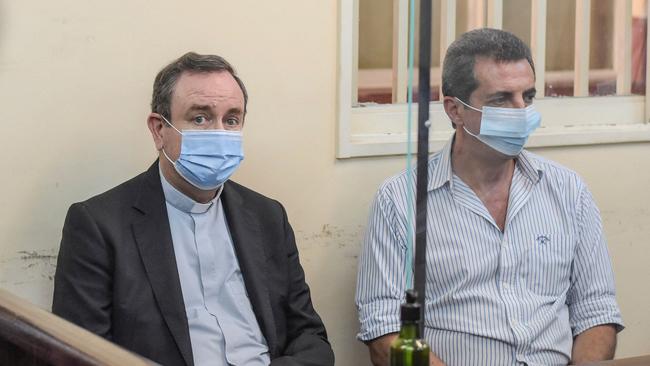Associate of Pope found guilty of sexual abuse in Argentina
Allegations over Bishop Gustavo Zanchetta’s conduct raised questions over pope’s handling of abuse cases.

Bishop Gustavo Zanchetta, a longtime associate of Pope Francis, has been convicted by an Argentine court of sexually assaulting young men in a case that has raised questions about the Pope’s handling of sexual abuse at the highest level of the Catholic hierarchy.
A court in Oran, in Argentina’s northern province of Salta, where Bishop Zanchetta, 58, served from 2013 to 2017, on Friday sentenced him to four years and six months in prison for the assault on two former seminarians there.
Several men said they communicated their accusations to the Vatican before the Pope assigned Zanchetta to a high post there in 2017. Zanchetta remained in his Vatican post for more than two years after the accusations became public. In 2019, he was tried by the Vatican’s doctrinal office on unspecified accusations.
Prosecutors in Argentina said they sought documentation from the bishop’s Vatican trial. But the results were never made public, and prosecutors said the Vatican didn’t provide the documentation.
“This is a stunning ruling from the Pope’s homeland. It’s a sign that even where the Catholic Church wields power, civil societies increasingly will not tolerate sexual abuse of young adults by powerful figures, even if the accused is a Catholic bishop, and even if that bishop is supported by Pope Francis himself,” said Anne Barrett Doyle of BishopAccountability.org, which tracks abuse cases around the world.
In a small courtroom in Oran, a three-judge panel delivered the sentence. Zanchetta, wearing a dark suit, clerical collar and mask, mostly looked down as the verdict was read.
On Friday, relatives and friends of the seminarians cried outside the courthouse after the verdict was announced. Some said they were angry that the bishop didn’t receive a tougher sentence.
“We asked for eight years. This isn’t enough,” one woman at the court told El Tribuno newspaper.
Another woman at the court said Bishop Zanchetta’s victims had been emotionally damaged by their experience. “They don’t have work … Their life is one of trauma,” she said.
Carlos Lombardi, an Argentine lawyer who works with victims of sexual abuse in the country’s Catholic Church, called Zanchetta’s conviction a blow to Pope Francis, raising doubts about the church’s commitment to tackling the crisis.
“They don’t protect the rights of the victims,” said Mr Lombardi, who wasn’t involved in Zanchetta’s case. “They cover up for the priests.”
Before he was appointed Pope, then-cardinal Jorge Mario Bergoglio served as president of the Argentine bishops conference while then Father Zanchetta served as the body’s general secretary near Buenos Aires.
He was one of the first bishops appointed by Pope Francis, shortly after the latter’s election in 2013, and assigned to Oran, a city of 350,000 in a sprawling province that features highland wineries and resorts as well as destitute indigenous communities and drug smuggling.
In December 2017, Francis appointed the bishop to a senior position in the Vatican office that manages a large part of the Holy See’s real estate holdings and financial investment.
In late December 2018, El Tribuno reported that three priests had accused Zanchetta of sexual abuse and economic malfeasance, bringing their allegations to the Vatican’s envoy in Buenos Aires in 2016. The report suggested that the Pope could have known of the accusations before he brought the bishop to Rome.
The Vatican spokesman said at the time that no accusations of sexual abuse had emerged until the northern autumn of 2018. He said the bishop had resigned from his diocese in 2017 because of “very tense relations” with the priests under his authority there.
In May 2019, Pope Francis revealed in an interview with Mexican television that Zanchetta was being tried by the Vatican’s doctrinal office.
The Pope said he had known before the bishop resigned about accusations that he had kept pornographic images on his mobile phone, but he said that the bishop had “defended himself well”, claiming his phone had been hacked.
The Wall Street Journal


